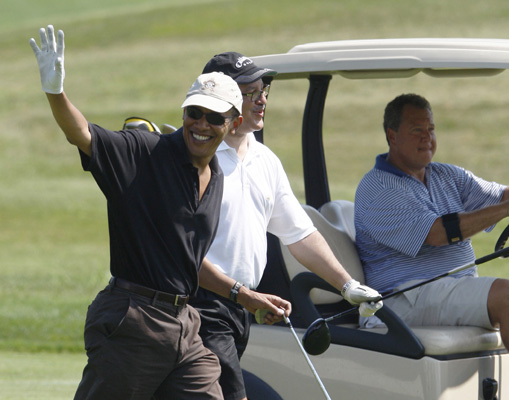Search
Democracy Links
Member's Off-site Blogs
a great game .....

Last August, the presidential press corps followed Barack Obama and his family to Martha's Vineyard for their brief vacation. The coverage focused on summery fare - a visit to an ice cream parlor, the books the president had brought along. Nearly everyone mentioned his few rounds of golf, including his swing, and the enthusiasm of onlookers.
What caught my eye, though, was the makeup of his foursome. The president was joined by an old friend from Chicago; a young aide; and Robert Wolf, Chairman and CEO, UBS Group Americas. In a decidedly incurious piece, a New York Times reporter made light of Wolf's presence:
"The president has told friends that to truly relax he prefers golfing with young aides...But he departed from that pattern Monday when he invited a top campaign contributor, Robert Wolf, president of UBS Investment Bank, to join him for 18 holes. Call it donor maintenance."
Wolf, however, is hardly - as the Times suggested - just another donor. For one thing, he is a leading figure in an industry that almost brought down the entire financial system - and then was the recipient of astonishing government largesse. UBS, along with other banks, benefited directly from the backdoor bailout of the insurance giant AIG.
But UBS stands alone in one rather formidable respect - it was the defendant in the largest offshore tax evasion case in U.S. history, accused of helping wealthy Americans hide their income in secret offshore accounts. To settle a massive investigation, UBS forked over $780 million to the US treasury. This settlement came shortly before Wolf rounded out Obama's golfing party. Given this rather problematical situation, why then would the President choose UBS's Wolf of all people for this honor?
Wolf declined a request for an interview about his relationship with the President, so it was not possible to pose that question to him. This hardly matters, though, for the story goes far beyond Wolf and UBS. It involves Republicans as well as Democrats, the Bush Administration as well as Obama's. More importantly, behind the trivialized golf outing on Martha's Vineyard, lie the interests that increasingly set the course for every administration. And that now game the system so well that the rest of us - wherever we live in the world - are kept fighting for the scraps.
When most people criticize those aspects of government that seem most impervious to the democratic process, they cite the permanency and perceived self-interest of the mandarins of the Washington bureaucracy. But when it comes to real power, an ability to come out ahead no matter which party is in power, it's hard to top certain financial institutions.
UBS is very much a part of that permanent government. Though not a household name in the United States, UBS is a major player in the Beltway game. During the 2008 campaign, while Robert Wolf was courting Democratic hopeful Obama, his UBS cohort, former Senator Phil Gramm, was working the other side of the street. As chairman of the Senate Banking Committee in the 1990s, Gramm, a corporate-friendly Texas Republican, played a key role in the deregulation of the banking industry, an act so central to the nation's financial collapse. Since 2002, Gramm has been UBS Americas' vice chairman. In 2008, he was the leading economics adviser for Obama's opponent, John McCain - and even touted as a possible treasury secretary in a McCain administration.
The bottom line: UBS hedged its bets, and so had an inside track no matter which party took the White House. Thus, when Obama won, it was Wolf who ascended. The new president named the banker-donor to his White House Economic Advisory Board.
The important machinations behind this accrual of influence rarely get attention in the frenzied hustle of the news cycle. One reason is that they do not seem like news at all, since they are essentially woven deeply into the fabric of politics and government, thus hidden in plain sight. Another is that they are dauntingly complex.
Some things are simple, though. Like the fact that a UBS executive is a dubious candidate to serve as an economic advisor to the president. For one thing, the company's track record at the time of the election was distinctly underwhelming. UBS suffered major losses on subprime lending, and had to raise money from the Singapore government and other entities. As Slate's money columnist Daniel Gross quipped back in 2008, "UBS used to stand for Union Bank of Switzerland. But perhaps it should stand for Untold Billions Squandered. Or Underwater Bi-Lingual Schleppers." Furthermore, UBS' stock lost nearly 70 percent of its value even before the recession really kicked in - making it the worst performing foreign bank operating here.
Given this damning set of facts, Wolf made both an odd choice as a presidential adviser and a peculiar pick for that intimate round of golf.
The Game That Goes On And On: A Swiss Bank, A President, And The Permanent Government
- By John Richardson at 26 Jun 2010 - 3:46pm
- John Richardson's blog
- Login or register to post comments
Recent comments
50 min 29 sec ago
40 min 49 sec ago
9 hours 57 min ago
10 hours 52 min ago
10 hours 55 min ago
11 hours 1 min ago
10 hours 14 min ago
11 hours 13 min ago
11 hours 34 min ago
12 hours 33 min ago